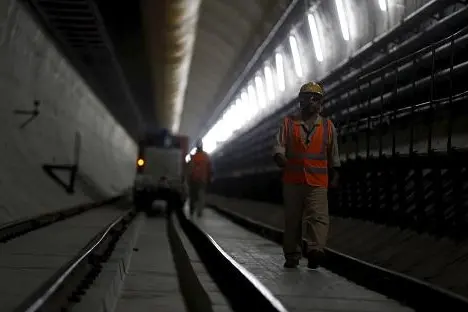PHOTO
Thursday, Sep 29, 2016
Dubai: The six Gulf countries have agreed in principle to push back the completion date of a 2,100 kilometre transnational rail network stretching from Kuwait to Oman by three years to 2021, the United Arab Emirates’ Minister for Infrastructure said on Thursday.
Ministers from Bahrain, Kuwait, Oman, Qatar, Saudi Arabia and the UAE met in Riyadh in April to discuss a more plausible deadline to connect the six states by rail after the original 2018 deadline was seen to be unrealistic.
“In principle we agreed on 2021 as a ceiling,” Abdullah Belhaif Al Nuaimi, the UAE minister, told reporters at the ministry.
GCC ministers will meet again “later this year” where it is hoped the six states will give a firm commitment to a new deadline date, Al Nuaimi said. “Some countries might link before then (2021) [and] some of them might even need a higher ceiling.”
Oil has more than halved since mid-2014 to an average of around $43 a barrel this year, causing major cuts to government spending in the Gulf states. Asked if the regional delay was for economic reasons, Al Nuaimi said, “I wouldn’t say no.” On Wednesday, the 14-member Organisation of Petroleum Exporting Countries (Opec), which includes Kuwait, Qatar, Saudi Arabia and the UAE, agreed to limit oil production, driving the price of benchmark Brent crude up as much as 5.9 per cent.
Etihad Rail, the state entity building the UAE’s network, suspended the tender process for phase two in January, which included building a link to neighbouring Oman.
“The suspension was logical because you simply cannot build your part and wait for others,” Al Nuaimi said. The UAE network “is not on hold,” he said, despite the suspension.
Construction of the UAE’s network has focused in Abu Dhabi’s hydrocarbon-rich Western Region where a completed rail link is used to move sulphur from inland to the coast. The UAE’s original plans see the rail network stretching across the seven emirates and linking the country with Oman and Saudi Arabia through Abu Dhabi.
“We really need to see if” the other Gulf states are “as serious as much as we are,” Al Nuaimi said. “We would like to see it completed by 2021.”
Etihad Rail’s decision to delay the construction of phase two prompted Oman to announce it would refocus on developing its domestic network.
The regional rail link is seen as a major political and economic initiative to bring the six Gulf states even closer.
By Alexander Cornwell Staff Reporter
Gulf News 2016. All rights reserved.





















